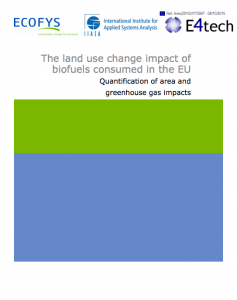 Earlier this month the European Commission released its new report, “The land use change impact of biofuels consumed in the EU,” (GLOBIOM). The study assessed the (indirect) land use change (LUC) impacts of biofuels demand expected as a result of Europe’s 2020 climate and energy policy. According to the European Renewable Ethanol Association (ePURE), the study found that increased demand for European produced ethanol would have low impacts on land use change and confirms ethanol’s high net greenhouse gas (GHG) savings.
Earlier this month the European Commission released its new report, “The land use change impact of biofuels consumed in the EU,” (GLOBIOM). The study assessed the (indirect) land use change (LUC) impacts of biofuels demand expected as a result of Europe’s 2020 climate and energy policy. According to the European Renewable Ethanol Association (ePURE), the study found that increased demand for European produced ethanol would have low impacts on land use change and confirms ethanol’s high net greenhouse gas (GHG) savings.
The study was conducted by IIASA, Ecofys and E4Tech at the request of the European Commission. The report found that the increased demand from ethanol made from sugar and starch crops, such as corn, along with cellulosic biomass bill have low impacts ILUC. In addition, the study found that this increase in demand will have no impact on food prices through 2020.
Specifically, the study finds that:
- Conventional ethanol feedstocks, such as sugar and starch crops, have much lower land use change emissions impacts than other biofuel feedstocks. For example, in Europe the key feedstocks used to produce ethanol would have LUC emissions of 14g CO2 e/MJ for maize, 15g CO2 e/MJ for sugar beet and 34g CO2 e/MJ for wheat.
- Cellulosic ethanol feedstocks similarly have a low or even positive LUC impact (16g CO2 e/MJ for straw ethanol, 0g CO2 e/MJ if a sustainable straw removal rate is introduced, -12g CO2 e/MJ and -29g CO2 e/MJ for perennials and short rotation crops).
- Land use change impacts and associated emissions can be much lower if: abandoned land in the EU is used for biofuels production; yield increases occur as a result of biofuels demand; and/or peat drainage in Malaysia and Indonesia is halted.
ePURE says these findings re-confirm the strong environmental benefits of European produced ethanol. The groups is also calling on the European Commission to use these findings as a guide while assessing policy options to decarbonise the transportation sector beyond 2020.
“The GLOBIOM study confirms that European ethanol has low LUC impacts, makes a strong contribution to reducing GHG emissions in the transport sector and has little or no effect on food prices,” said said Robert Wright, Secretary-General of ePURE. “The study’s findings clearly show that European ethanol, produced from sugar and starch crops and cellulosic biomass, has high net GHG emission savings and is the type of good biofuel that Europe should promote if it is serious about achieving its 2030 renewables and climate ambitions.”
Wright concluded, “We urge European policy-makers to reflect on these findings and identify ways to promote and incentivize the use of biofuels that have high GHG savings and low LUC impacts, such as European ethanol.”

